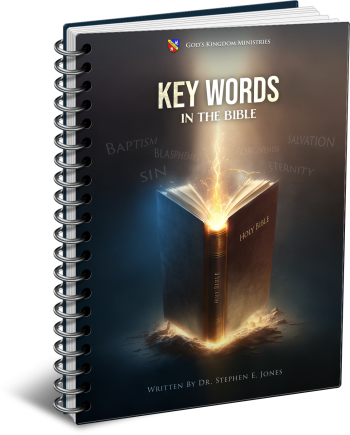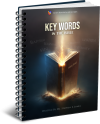Latest Posts
View the latest posts in an easy-to-read list format, with filtering options.

To understand what Scripture says, one must know the meaning of words and key concepts. This book is designed to prevent misunderstanding.
Category - General

In Proverbs 8:1, 20, 22, 27, the voice of wisdom says,
1 Does not wisdom call, and understanding lift up her voice?... 22 The Lord possessed me at the beginning of His way, before His works of old… 20 I walk in the way of righteousness; in the midst of the paths of justice… 27 When He established the heavens, I [wisdom] was there, when He inscribed a circle on the face of the deep.
The early church took these statements to be prophetic of Christ Himself, who was in the beginning and through whose word (logos) all things are created. He is the personification of wisdom itself. So Paul tells us in 1 Cor. 1:30,
30 But by His doing you are in Christ Jesus, who became to us wisdom from God, and righteousness and sanctification, and redemption.
John 1:1 tells us that “in the beginning was the Word,” but we may qualify that Word, saying, “In the beginning was the Word of wisdom and righteousness.” It was the spoken word of wisdom that spoke: “Let there be light” (Gen. 1:3). Such is the power of wisdom, for we hear the voice of wisdom asserting in Prov. 8:14, “power is mine.”
Wisdom is one of the three main attributes of God: Power, Wisdom, and Love. Power is the ability to accomplish one’s goal; Wisdom is the skill to devise a successful plan; Love is His motivation and is the construction material of that plan. Eccl. 10:10 says, “wisdom has the advantage of giving success.”
The Hebrew word for wisdom is chokmah. It is spelled chet (“enclosure, fence”), kaf (“palm, open hand”), mem (“water, chaos, immensity”), and hey (“what comes from”). It pictures the wise God using His hands to enclose (or organize) the upper and lower waters of the “firmament” (KJV)—the great “expanse.” Gen. 1:7, 8 says,
7 God made the expanse and separated the waters which were below the expanse from the waters which were above the expanse; and it was so. 8 God called the expanse heaven…
Jeremiah 51:15 says,
15 It is He who made the earth by His power, who established the world by His wisdom, and by His understanding He stretched out the heavens.
Built into the Hebrew word itself is the story of God’s creative skill. Let no one say that His plan fails in any way, for if it were to fail, it would show a lack of wisdom.
Psalm 104:24 tells us,
24 O Lord, how many are Your works! In wisdom You have made them all; the earth is full of Your possessions.
James 1:5, 6 says,
5 But if any of you lacks wisdom, let him ask of God, who gives to all generously and without reproach, and it will be given to him. 6 But he must ask in faith without any doubting…
Perhaps James was thinking of Solomon, who asked for wisdom. We read in 2 Chron. 1:7, 10,
7 In the night God appeared to Solomon and said to him, “Ask what I shall give you….” 10 [Solomon responded] “Give me now wisdom and knowledge that I may go out and come in before this people, for who can rule this great people of yours?”
God honored his request (2 Chron. 1:12), so the king testified in Prov. 2:6, 7,
6 For the Lord gives wisdom; from His mouth come knowledge and understanding. 7 He stores up sound wisdom for the upright...
As a young man, the prophet Daniel confessed that he had no more wisdom than any other man (Dan. 2:30). However, when he was old, they called upon him to interpret the handwriting on the wall, because Daniel’s wisdom was recognized. In Dan. 5:11, men told the king,
11 There is a man in your kingdom in whom is a spirit of the holy gods; and in the days of your father, illumination, insight and wisdom like the wisdom of the gods were found in him…
Job 12:12 tells us,
12 Wisdom is with aged men, with long life is understanding.
Scripture does not define “aged men,” but the numeric value of chokmah (“wisdom”) is 73. Perhaps this may suggest something.
Every word of the Lord is an expression of God’s nature (Power, Wisdom, and Love). So, too, the law itself is an expression of God’s love, for the entire law hangs upon two great commandments of love (Matt. 22:36-40). Paul affirms this in Rom. 13:8, saying, “he who loves his neighbor has fulfilled the law.” Again, Rom. 13:10, says, “love is the fulfillment of the law.”
Moses said in Deut. 4:5, 6,
5 See, I have taught you the statutes and judgments just as the Lord my God commanded me, that you should do thus in the land where you are entering to possess it. 6 So keep and do them, for that is your wisdom and your under-standing in the sight of the peoples who will hear all these statutes and say, “Surely, this great nation is a wise and understanding people.”
Those who despise the law have cast out wisdom. Those who fail to study the law lack wisdom, and if they ask God for wisdom, He directs them to study the basics in His righteous law.
Deut. 4:8 continues,
8 Or what great nation is there that has statutes and judgments as righteous as this whole law which I am setting before you today?
Prov. 9:10 tells us, “the fear of the Lord is the beginning of wisdom.” The Hebrew concept of fear can refer either to carnal fear or godly fear. Carnal fear is akin to terror; godly fear is reverence and acknowledgement that God has the right to rule all that He has created. This is set forth in the First Commandment, where we read in Deut. 5:7, “You shall have no other gods before Me.” To fear God is to follow this Commandment, and this is the beginning of wisdom. One might also apply this to the greatest commandment in Deut. 6:5,
5 You shall love the Lord your God with all your heart and with all your soul, and with all your might.
A few verses later, we see what this means in Deut. 6:13, 14,
13 You shall fear only the Lord your God; and you shall worship Him and swear by His name. 14 You shall not follow other gods, any of the gods of the peoples who surround you.
Hence, the fear of the Lord is to recognize Him alone as our Sovereign King, the Head of government for God’s Kingdom. This is the beginning (source) of wisdom. Wisdom begins with recognizing Him as the one true God, His right to rule, and His right to establish laws in accordance with His nature that define righteousness.
Paul speaks of two kinds of wisdom in 1 Cor. 2:4, 5,
4 and my message and my preaching were not in persuasive words of wisdom, but in demonstration of the Spirit and of power, 5 so that your faith would not rest on the wisdom of men, but on the power of God.
Paul goes on to explain that the wisdom of men is foolishness to God, and vice versa. 1 Cor. 1:18 says,
18 For the word [logos, “word, logical word”] of the cross is foolishness to those who are perishing, but to us who are being saved, it is the power of God.
When God told Moses to cast a tree into the bitters of Marah to make the waters sweet (Exodus 15:25), those who were schooled in philosophical wisdom probably thought that this was utter foolishness. But the logic of the cross said, “The cross (tree) will sweeten the bitter waters of the heart, so that you may become a well of living water.”
When Elisha sent word to Naaman, the Syrian, to be baptized seven times in the Jordan to heal his leprosy, he simply told the Syrian general to obey the instruction in the law (Lev. 14:7). “This is your wisdom,” Moses said, not the wisdom of this world, but the wisdom of God that looks like foolishness to those who have earthly wisdom.
“Yet wisdom is vindicated by her deeds” (Matt. 11:19). Naaman was healed of his leprosy through the principle of baptism, which leads us from death to resurrection life. The results of his faith in the wisdom of God proved the validity of the wisdom of God.
Likewise, as we read in 1 Cor. 1:19, 20,
19 For it is written, “I will destroy the wisdom of the wise, and the cleverness of the clever I will set aside.” 20 Where is the wise man? Where is the scribe? Where is the debater of this age? Has not God made foolish the wisdom of the world?
The wisdom of the world is something that is developed by the soul, or “natural man” (1 Cor. 2:14), which is the “old man” of flesh that traces its ancestry back to Adam. The wisdom of God, however, is something that is inherent to our spirit, that is, the inner man, the “new man” that is begotten by God.
The natural (psukikos, “soulish”) man cannot comprehend spiritual things. It can only submit to the leading of the spirit as a good servant. If we understand spiritual things, it is because our spirit knows such things, because “we have the mind of Christ” (1 Cor. 2:16).
Hence, our wisdom is either soulish or spiritual. It is either something we learn in school when we educate the soulish mind, or it is something that is given by Holy Spirit revelation through the mind of our spirit. Earthly wisdom is good, but heavenly wisdom is better and is our inheritance.